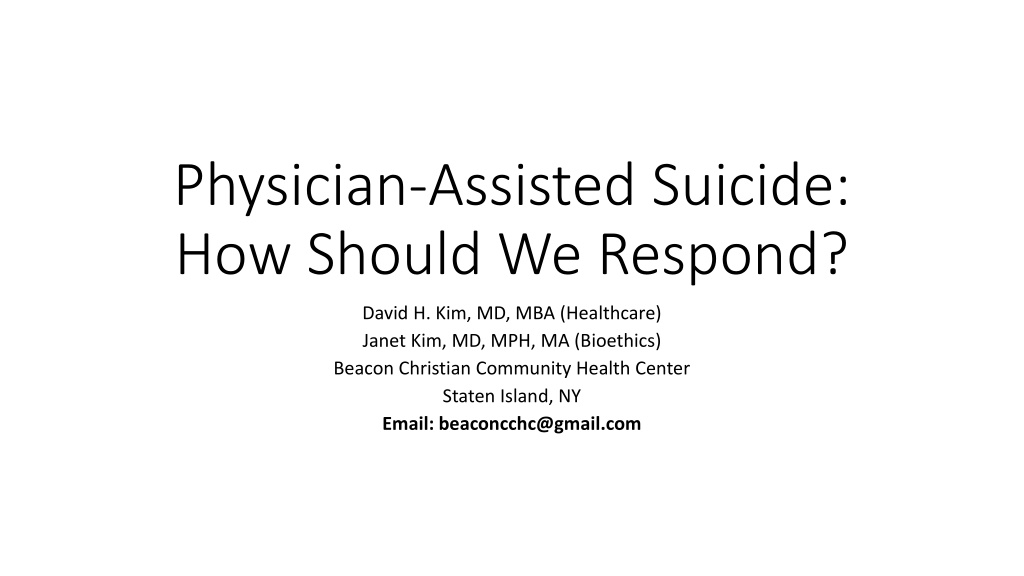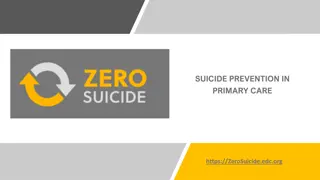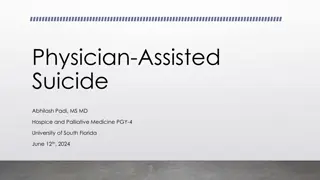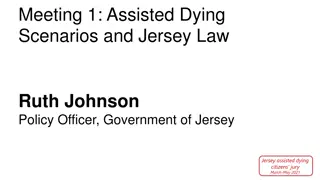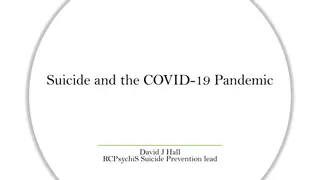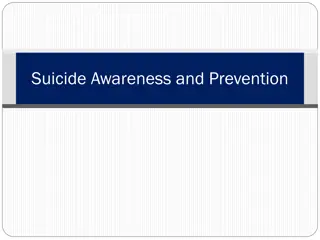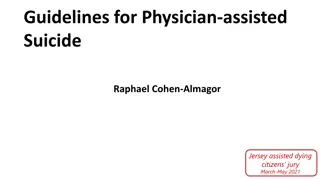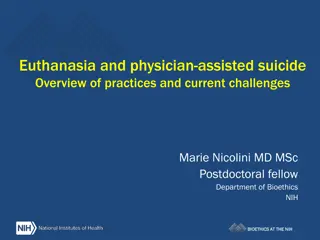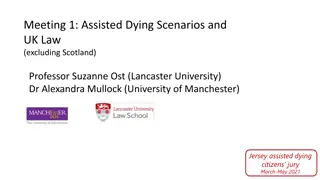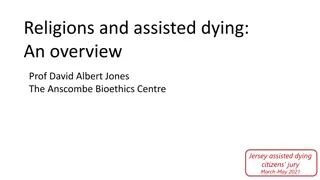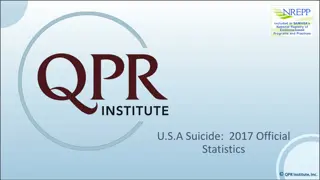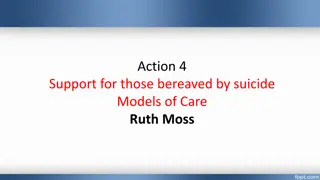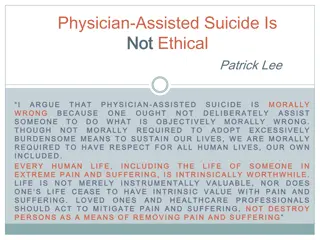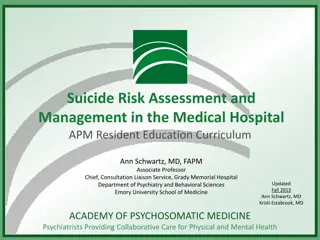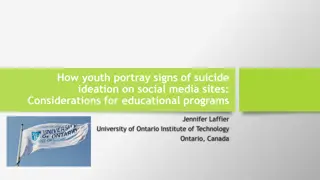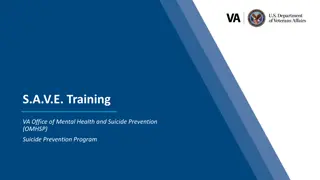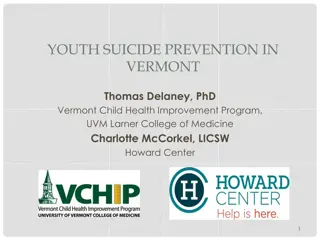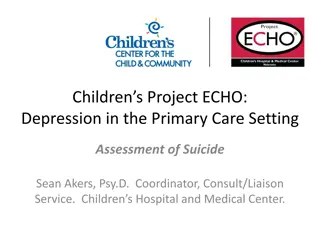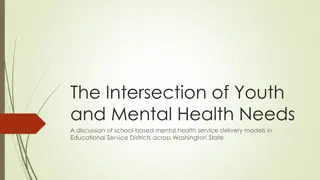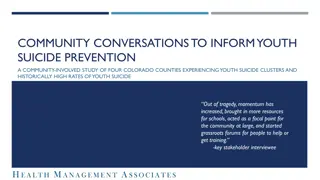Challenges of Physician-Assisted Suicide: A Christian Perspective
Physician-Assisted Suicide (PAS) is a contentious issue under consideration in over 20 US states. This article presents concerns about PAS, emphasizing its negative impact on vulnerable populations and the sacred doctor-patient relationship. It explores ethical, cultural, and legislative implications through a Christian lens, advocating for sensitive discussions and engagement without resorting to political activism. The problematic nature of PAS legislation, its potential consequences, and the importance of seeking wisdom and discernment are highlighted.
- Physician-Assisted Suicide
- Christian Perspective
- Ethical Issues
- Health Legislation
- Vulnerable Populations
Download Presentation

Please find below an Image/Link to download the presentation.
The content on the website is provided AS IS for your information and personal use only. It may not be sold, licensed, or shared on other websites without obtaining consent from the author. Download presentation by click this link. If you encounter any issues during the download, it is possible that the publisher has removed the file from their server.
E N D
Presentation Transcript
Physician-Assisted Suicide: How Should We Respond? David H. Kim, MD, MBA (Healthcare) Janet Kim, MD, MPH, MA (Bioethics) Beacon Christian Community Health Center Staten Island, NY Email: beaconcchc@gmail.com
The Concern 20+ states in the US have a bill under consideration to make Physician-Assisted Suicide (PAS) legal Some are in committee Some are about to be voted on in the legislature To allow passage of PAS legislation will hurt vulnerable populations, especially the poor and the disenfranchised PAS undermines the trusted relationship between patient and physician, which needs to be held sacred PAS cannot be biblically supported as a way of handling suffering (eg. What does the Bible say about how we should handle suffering?)
The Invitation To discuss in a sensitive and caring manner how we as Christians are to address the potential effects an ethical, cultural and legislative issue such as PAS may have on our patients, communities and culture at large To figure out ways to engage our communities, our community leaders, and our patients in a Jeremiah 29:7-based manner (See: Daniel, his three friends, etc) To enjoy meaningful fellowship together as we explore this issue The key is NOT to turn this into a cry for political lobbying or activism; that is NOT a Jeremiah 29:7 approach
Goals for today Discuss the concern and its potential consequences See what has happened thus far in real-life application of PAS in the US (the Oregon law) Discuss what we SHOULDN T do Discuss what we SHOULD do Pray for wisdom and discernment as a group on this and other related societal, ethical and legislative issues that may challenge our faith in the culture we are in
The Problem PAS is bad policy bad law Undermines the doctor-patient relationship by having the physician/provider be assisting the suicide act; the healer becomes the one to hasten death; perversion of thousands of years of thinking about the doctor s fundamental role Places pressure on the vulnerable of society, including disabled, poor, immigrants, who may think that suicide is a better option. Assaults the imago Dei on humans, which says that our value is simply based on us being made in the image of God (Gen 1:26a), not dependent on our function or utility. Assumes that the way to solve faults in current legislature is to pass another law to counteract it (ex. lack of insurance coverage for suicide in NY as a justification for this)
The Consequences God calls us as the Church to stand for life-affirming values, especially if it is counter-cultural Current culture does not value what Christ values Commandment to love our neighbor We as Christ-followers need to show our neighbors and the watching world that suffering can have redeemable value Rom 8:28 all things work together for OUR good Rom 8:18 I consider that our present sufferings are not worth comparing with the glory that will be revealed in us. Fred Rogers: There is no normal life that is free of pain. It s the very wrestling with our problems that can be the impetus for our growth.
The Oregon Experience First state to pass PAS What has happened in OR since then? Insurances are less likely to cover chronic care options and instead cover PAS Numerous published anecdotal stories about coercion of patients, failure of actual suicides, etc Desensitization of local culture national culture about life Effects on other states California New Jersey Vermont New York
How should we NOT respond? Must not be angry Cannot use judgmental or emotional arguments Need to be bilingual to be able to speak in love with Christ- centered values without using Christian terminology to communicate our viewpoint
How SHOULD we respond? Must understand the psyche of the dying and those who want to commit suicide Psychology Today (May 2014) successful suicide across the board is based on overcoming the basic will to live by believing that life is hopeless and meaningless NOT on the circumstances (https://www.psychologytoday.com/blog/curious/201405/why-do-people- kill-themselves-new-warning-signs) Must think Jeremiah 29:7 - Think of how to engage our patients, our community, our community s leaders this is NOT a political action, this is action to seek the shalom of the community We must be able to speak fluently into the culture on the use of suffering for good and the advantages of a culture of life.
Key things to consider As the Christian healthcare family, what are our next steps? Educate yourselves, fellow providers, and staff must remain knowledgeable of the issues and available options November 7 educational opportunity sponsored by the Catholic church in Albany, NY Health care providers need to consider intentional planning on cultural and community engagement Begin to network with key patients, community members, churches Consider legislative involvement if God so calls you to do so American Association of Medical Ethics/CMDA Pray we are captives in Babylon Jeremiah 29:7, 2 Timothy 1:7
Key things to consider Contention 1: Culture of death exists in this country is it a majority view? if it is, then we are in trouble. If it isn't then we are all being manipulated Contention 2a: The assumption is being made that suffering is bad Contention 2b: Even Christians are finding themselves susceptible to agreeing to the culture of death and against suffering Contention 3: Any policy or law that seeks to relieve suffering is good when in fact that may not always be the case Contention 4: At the very least, we should allow a legal choice infinite regression into complete individualism Contention 5: Suicide in general assumes that there is no impact of one's life or death to anyone else again, infinite regression into complete individualism a different way creation otherwise of arbitrary "limits" Contention 6: All problems can be solved by law What does law do? reduces human behavior to the least common denominator cannot be used to replace moral or ethical behavior but in a moral vacuum it does, dangerously
Questions and Discussion Drs. David and Janet Kim Beacon Christian Community Health Center Email: beaconcchc@gmail.com
